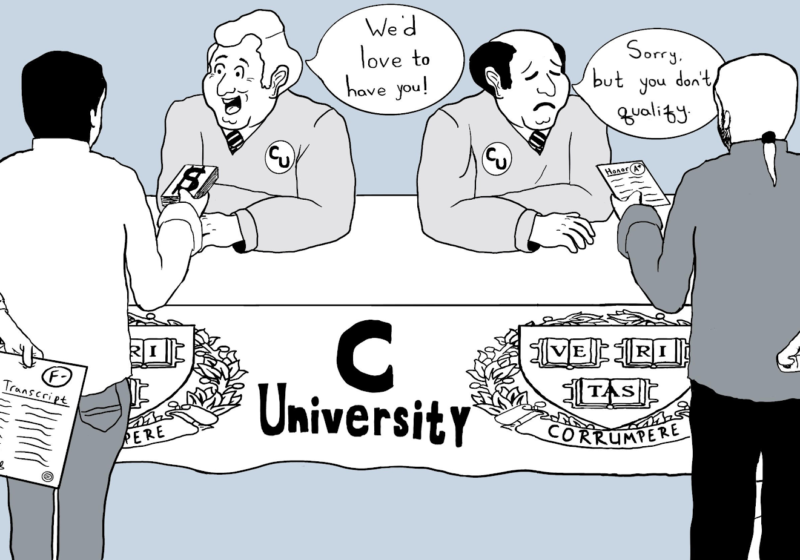It’s been hard to avoid the recent college admissions scandals, in which many rich and famous parents tried to buy their children spots at elite universities. This involved mail fraud and bribing athletic coaches and standardized test proctors, sometimes to the tune of hundreds of thousands of dollars.
Notably, the universities were themselves unaware of what was happening. Unlike a case such as Jared Kushner’s acceptance to Harvard with the benefit of a $2.5 million donation, the money in this scandal went to the scheme’s organizer, Rick Singer. Many of the students involved also didn’t know what was going on: they took their standardized tests, only to have the proctors boost their scores.
This scandal is only the tip of the iceberg when looking at the advantages that wealth provides for applying to college across the board. The median family income among UR students is $126,000, over double the national average. At more elite schools like Harvard, it’s $168,000. Even at Michigan State, a less selective public school, the median income was $115,000. When middle-class people, like myself, qualify as low-income at any college in America, something has gone seriously wrong in our society.
Numbers like that don’t happen naturally, and they severely limit social mobility and meritocracy. Some of those advantages are baked-in by the time students apply for college. Growing up wealthy likely means that you had a stable home life — in a safe, clean neighborhood — with good schools that didn’t face shortages of basic necessities like paper. It means you didn’t have to fear being shot leaving school like students in parts of Chicago. You weren’t exposed to neurotoxic chemicals, like children in Flint. Your school probably had a working furnace in the freezing winter. Students in Detroit weren’t so lucky.
Despite these disadvantages, many low-income students are still academically qualified to go to college, even to elite universities, and many more would if the government did some simple interventions. One intervention would be to make ACT/SAT testing mandatory and free nationwide. It’s true that standardized test scores correlate with wealth because richer students can afford expensive test prep, or to rig the system like Singer did. But the biggest problem with those tests is that not all students take them. Many high performing, low-income students don’t take college exams even though they would achieve high scores. When Michigan made ACT testing universal in 2007, 480 high-scoring, low income students were discovered for every 1000 who had been taking the test before. The effects of the universal test were so large because, beforehand, only 34 percent of low-income students were taking the exam at all . If that policy were applied nationwide, the effects of wealth in admissions would be seriously mitigated.
The other easily solvable problem is that low-income students often misjudge the costs of college and of applying to college. They may not know that application fees are often waived for them, or that because of financial aid, they will pay far less than the sticker price for college, especially at selective colleges with high sticker prices. Because of that, they either don’t apply to college at all or apply to less selective colleges, where they will end up paying more money and have fewer academic resources. Two economists, Sarah Turner and Caroline Hoxby, mailed out information that clarified all of this as part of a study. They found that high-achieving, low-income students who got this information applied to 50 percent more colleges and were 80 percent more likely to be accepted to colleges that matched their academic ability.
Although small interventions like these can’t solve the overall problems with education in the US, they do show that the issue isn’t insurmountable. The total cost of making college testing free, plus sending out the information that Hoxby and Turner did, is only $54 per student. Even making public colleges completely free would only cost $50 billion a year, about the same cost as the increase in the military budget Trump is asking for, essentially a blip in the federal budget. Do we value endless wars and tax cuts for the uber-wealthy more than equality of opportunity for the worst off?






